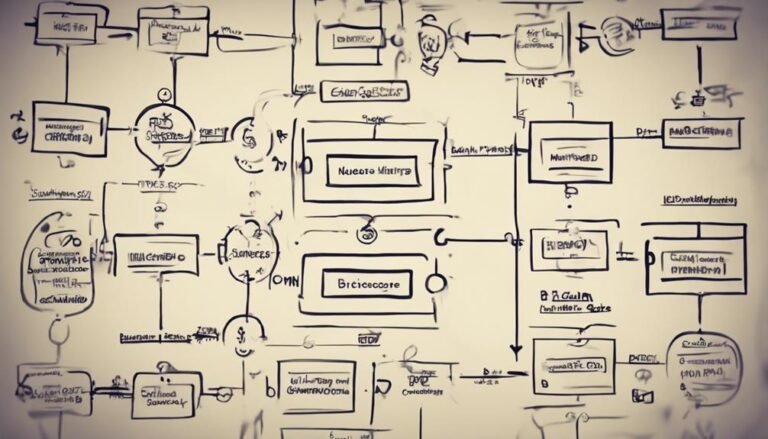Lean Management for SMEs
In the competitive landscape of today's business world, small and medium-sized enterprises (SMEs) often face the challenge of optimizing their operations to remain agile and profitable.
Lean management principles have proven to be a valuable framework for organizations looking to streamline processes, eliminate waste, and enhance overall efficiency. By adopting lean methodologies, SMEs can unlock significant improvements in productivity and cost-effectiveness.
However, the journey towards lean transformation is not without its hurdles. How can SMEs effectively navigate the complexities of lean implementation and sustain continuous improvement efforts?
Let's explore the strategies and best practices that can guide SMEs towards operational excellence and sustainable growth.
Key Takeaways
- Adapt Lean principles for small and medium enterprises
- Overcome implementation challenges with change management
- Measure performance with aligned KPIs for continuous improvement
- Cultivate a Lean culture through leadership commitment and employee involvement
Understanding Lean Management Basics
In the realm of operational excellence, Lean Management stands as a foundational framework that emphasizes the elimination of waste while maximizing value creation in businesses of all sizes. Lean principles, rooted in the Toyota Production System, focus on delivering high-quality products or services efficiently by continuously improving processes. This methodology centers on customer value, respect for people, and the pursuit of perfection through the identification and elimination of non-value-added activities.
Process improvement lies at the core of Lean Management, aiming to streamline operations, reduce costs, and enhance overall business performance. By fostering a culture of continuous improvement and empowering employees to identify and address inefficiencies, organizations can achieve greater productivity and customer satisfaction. Lean tools such as value stream mapping, 5S, Kanban, and Kaizen play pivotal roles in driving process enhancements and promoting a lean mindset throughout the organization.
Understanding Lean Management basics is crucial for small and medium enterprises (SMEs) looking to optimize their operations, increase competitiveness, and achieve sustainable growth in today's dynamic business environment.
Implementing Lean Tools and Techniques
Effective implementation of Lean tools and techniques is essential for driving operational efficiency and continuous improvement within small and medium enterprises (SMEs). To ensure successful implementation, consider the following key points:
- Lean Implementation Challenges: Identify common challenges such as resistance to change, lack of top management support, and inadequate employee training.
- Solutions to Challenges: Address resistance through effective change management strategies, secure top management buy-in by demonstrating the benefits of Lean, and invest in comprehensive training programs to upskill employees.
- Lean Tools Effectiveness Analysis: Evaluate the effectiveness of Lean tools like Value Stream Mapping, 5S, Kanban, and Kaizen in streamlining processes, reducing waste, and enhancing overall productivity.
- Continuous Improvement Culture: Foster a culture of continuous improvement by encouraging employee involvement, providing regular feedback mechanisms, and celebrating small wins to sustain motivation and momentum in Lean implementation efforts.
Overcoming Challenges in Adoption
To successfully overcome challenges in adoption of Lean management practices within SMEs, a systematic approach that addresses key barriers with strategic solutions is imperative. Change management plays a crucial role in this process as it involves transitioning the organization from traditional methods to Lean practices.
Resistance factors, such as fear of the unknown, lack of employee buy-in, and inertia, often hinder successful adoption. It is essential to proactively identify these resistance factors and implement targeted strategies to mitigate them. Communication and training programs can help in creating awareness and building a culture that embraces change.
Additionally, involving employees in the decision-making process and soliciting their feedback can increase their engagement and commitment to Lean principles. Leaders should lead by example, demonstrating their dedication to Lean practices and inspiring others to follow suit.
Measuring Performance and Results
With the implementation of Lean management practices within SMEs, the measurement of performance and results becomes a critical aspect for assessing the effectiveness and impact of operational changes. To ensure success in this endeavor, the following key points should be considered:
- Performance Evaluation: Regularly assess the performance of processes and individuals to identify areas for improvement and track progress towards organizational goals.
- Outcome Analysis: Analyze the outcomes of Lean initiatives to determine their impact on efficiency, quality, and overall business performance.
- Metrics Tracking: Establish key performance indicators (KPIs) aligned with Lean principles to measure the success of Lean initiatives and overall business performance.
- Goal Achievement: Monitor progress towards achieving set goals and objectives, adjusting strategies as needed to ensure continuous improvement and sustainable results.
Creating a Lean Culture
To foster a Lean Culture within an organization, it is essential to focus on instilling core values and behaviors that align with Lean principles.
Additionally, implementing continuous improvement practices allows for ongoing refinement of processes and procedures to eliminate waste and enhance efficiency.
Values and Behaviors
Establishing a culture rooted in lean values and behaviors is fundamental for the successful implementation of lean management in small and medium-sized enterprises (SMEs). To create a lean culture within an organization, it is crucial to focus on values alignment and behavior modification. Here are four key strategies to foster a lean culture:
- Leadership Commitment: Top management must demonstrate a strong commitment to lean principles to set the tone for the entire organization.
- Employee Involvement: Encourage active participation from all employees in identifying improvement opportunities and implementing lean practices.
- Continuous Learning: Foster a culture of continuous learning and development to adapt to changing market conditions and enhance skills.
- Open Communication: Promote transparent communication channels to facilitate feedback, idea sharing, and problem-solving collaboratively.
Continuous Improvement Practices
Cultivating a culture of continuous improvement within small and medium-sized enterprises (SMEs) is pivotal for the successful implementation of lean management principles. To achieve this, SMEs can conduct regular kaizen workshops to encourage employees to identify and implement small, incremental changes in processes.
These workshops foster a sense of ownership and empowerment among employees, driving a lean mindset development throughout the organization. By instilling a culture that values continuous improvement, SMEs can adapt more effectively to changing market conditions, enhance operational efficiency, and sustain long-term growth.
Emphasizing the importance of ongoing improvement not only boosts employee engagement but also fosters innovation and competitiveness within the SME sector.
Employee Empowerment
Implementing a structured framework for employee empowerment is essential in fostering a lean culture within small and medium-sized enterprises (SMEs).
To achieve this, consider the following key points:
- Team Collaboration: Encourage teamwork and open communication among employees to share ideas, solve problems collectively, and drive continuous improvement.
- Leadership Support: Leaders must champion employee empowerment by providing guidance, resources, and recognition to motivate and engage staff.
- Training and Development: Invest in training programs to enhance employees' skills, knowledge, and confidence, empowering them to take ownership of their work.
- Feedback Mechanisms: Establish feedback channels for employees to voice their opinions, concerns, and suggestions, fostering a culture of continuous learning and improvement.
Continuous Improvement Strategies
To propel operational excellence within SMEs, the implementation of Kaizen principles and Gemba walks stands as paramount. These continuous improvement strategies serve as foundational pillars in enhancing productivity, streamlining processes, and fostering a culture of ongoing refinement.
Kaizen Principles Application
Applying Kaizen principles within small and medium-sized enterprises (SMEs) is essential for fostering a culture of continuous improvement and operational excellence. By embracing Kaizen, SMEs can make incremental changes that lead to significant improvements over time.
Here are four key strategies for effectively applying Kaizen principles:
- Employee Involvement: Encourage all employees to actively participate in identifying areas for improvement.
- Standardized Processes: Establish standardized procedures to ensure consistency and facilitate continuous evaluation.
- Continuous Training: Provide ongoing training to equip employees with the skills needed to drive improvements.
- Data-Driven Decision Making: Utilize data and key performance indicators to identify improvement opportunities and measure progress accurately.
Implementing these strategies will help SMEs embed Kaizen principles into their operations and drive sustainable growth.
Gemba Walk Implementation
Embracing the principles of Gemba Walk within small and medium-sized enterprises (SMEs) offers a strategic approach to enhancing continuous improvement efforts and operational efficiency. The Gemba Walk involves leaders going to the front lines where work is done to observe operations, engage with employees, and gain insights into processes.
This practice fosters employee engagement by empowering staff to contribute ideas for process improvement directly. By actively involving employees in the continuous improvement process through Gemba Walks, SMEs can identify inefficiencies, streamline workflows, and drive innovation from the ground up.
This hands-on approach not only improves operational efficiency but also cultivates a culture of collaboration and accountability within the organization, ultimately leading to sustainable growth and success.
Case Studies of Lean Success Stories
Several small and medium-sized enterprises have successfully implemented lean management principles, resulting in significant improvements in their operations and overall performance. These success stories highlight the transformative power of lean methodologies when applied effectively. Here are some key takeaways from these lean success stories:
- Focus on Lean Leadership: Strong leadership commitment to lean principles was crucial in driving change and fostering a culture of continuous improvement.
- Embracing Lean Innovation: Companies that encouraged innovation at all levels and empowered employees to suggest and implement new ideas saw remarkable results.
- Value Stream Mapping: Utilizing value stream mapping to identify and eliminate waste in processes led to streamlined operations and improved efficiency.
- Kaizen Implementation: The adoption of Kaizen principles, encouraging small, incremental changes over time, resulted in sustained improvements and enhanced employee engagement.
These case studies demonstrate that lean management is not only feasible for small and medium-sized enterprises but also highly beneficial in enhancing competitiveness and long-term success.
Conclusion
In conclusion, implementing lean management practices in SMEs can lead to significant improvements in efficiency and productivity.
According to a study by the Lean Enterprise Research Centre, companies that have successfully implemented lean strategies have seen an average reduction in lead time by 50% and a 25-75% increase in productivity.
By embracing lean principles and fostering a culture of continuous improvement, SMEs can achieve sustainable growth and competitive advantage in today's dynamic business environment.







